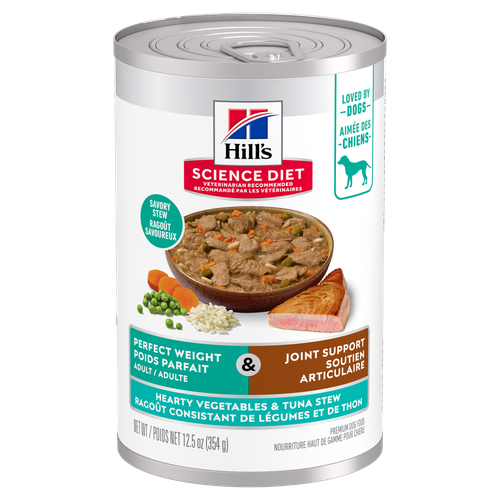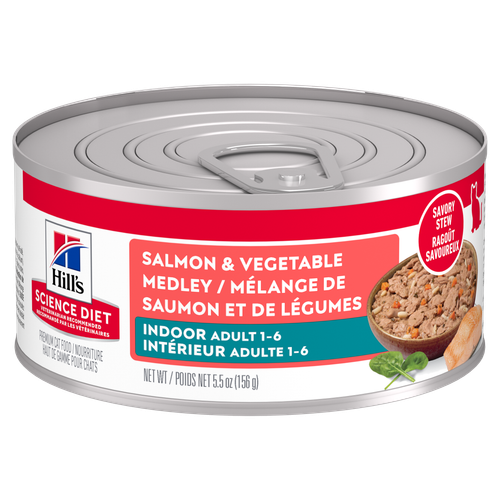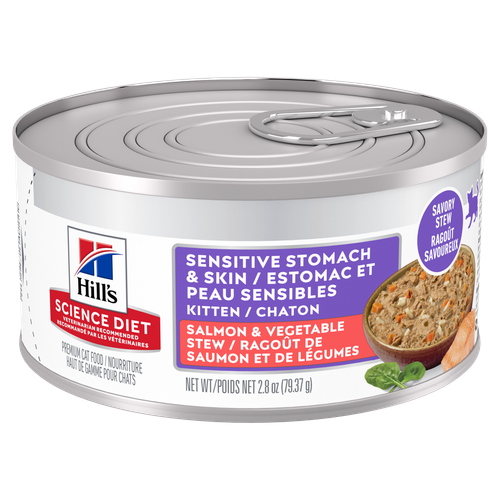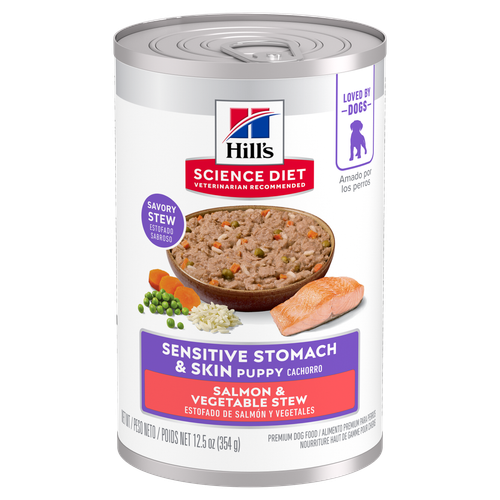
-
Find the right food for your petTake this quiz to see which food may be the best for your furry friend.Find the right food for your petTake this quiz to see which food may be the best for your furry friend.Featured products
 Healthy Cuisine, Adulte, assortiment de conserves
Healthy Cuisine, Adulte, assortiment de conservesHill's Science Diet Healthy Cuisine Variety Pack
Shop Now Sensitive Stomach & Skin, assortiment de conserves
Sensitive Stomach & Skin, assortiment de conservesHill's Science Diet Sensitive Stomach & Skin Variety Pack
Shop Now Adult Perfect Weight & Joint Support Hearty Vegetables and Tuna Stew Dog FoodShop NowFeatured products
Adult Perfect Weight & Joint Support Hearty Vegetables and Tuna Stew Dog FoodShop NowFeatured products Adult Indoor Salmon & Vegetable Medley Cat Food
Adult Indoor Salmon & Vegetable Medley Cat FoodPrecisely balanced nutrition for indoor cats with the delicious taste of savory salmon and vegetables
Shop Now Kitten Sensitive Stomach & Skin Salmon & Vegetable Stew
Kitten Sensitive Stomach & Skin Salmon & Vegetable StewSupports kitten growth, digestive health, nourishes skin and promotes a lustrous fur
Shop Now Adult Urinary Hairball Control Savory Chicken Entrée cat food
Adult Urinary Hairball Control Savory Chicken Entrée cat foodSupports the health of the whole urinary system with optimal levels of magnesium
Shop Now -
Dog
- Dog Tips & Articles
-
Health Category
- Weight
- Food & Environmental Sensitivities
- Urinary
- Digestive
- Joint
- Kidney
- Dental
- Cancer
-
Life Stage
- Puppy Nutrition
- Adult Nutrition
- Senior Nutrition
Cat- Cat Tips & Articles
-
Health Category
- Weight
- Skin & Food Sensitivities
- Urinary
- Digestive
- Kidney
- Dental
- Stress
- Cancer
-
Life Stage
- Kitten Nutrition
- Adult Nutrition
Featured articles Compare Your Pet Food's Calories to Other Brands
Compare Your Pet Food's Calories to Other BrandsCompare Hill's Science Diet dog and cat food's calories against other pet food brands and AAFCO recommended maximum calorie count.
Read More The Incredible Science Behind Your Pet's Microbiome
The Incredible Science Behind Your Pet's MicrobiomeLearn what a pet's microbiome is, how it contributes to your pet's gut & overall health, and why nutrition is important in maintaining healthy microbiomes.
Read More Pet Food Storage Tips
Pet Food Storage TipsDiscover how and where to store your dry, as well as canned, dog and cat food. Learn how to find the "best before" dates on all Hill's pet food packaging.
Read More -


Should you be worried if your pet ate a lizard? This is a fairly common question during warmer months and in warm climates where reptiles tend to roam. These small and speedy critters are as tempting to your pet as any other small prey animal. But are they harmful for your pet to eat? Read on to learn what to do if your dog or cat eats a lizard.
My Dog Ate a Lizard!

Some dog breeds have higher prey drives than others, but given the chance, any dog might happily gobble down a small lizard or frog. Unlike eating a small rodent, ingesting reptiles carries the risk of toxicity. Some toads and lizards secrete poison through their skin to help protect them from predators, while other lizards have venomous bites. According to Daily Puppy, even a nonvenomous or nonpoisonous reptile could transmit small parasites or bacteria like salmonella to your pooch, making him ill.
My Cat Ate a Lizard!
So, what should you do if your cat eats a lizard? While it's easier to minimize the risk of your kitty eating or touching lizards by simply keeping her indoors, lizards sometimes find their way inside, giving her an opportunity to pounce and devour before you even realize what happened. Along with the dangers of toxicity and infection, lizards also carry parasites called liver flukes that may be fatal for a cat if they become lodged in her bile duct, says The Nest.
Toxic Lizards
Your pet is unlikely to try to eat large venomous lizards such as Gila monsters (common to the Southwestern desert in the U.S.) or monitor lizards (found in the subtropics of Florida). However, since these lizards have enough venom to kill a dog or cat, keep your pet from trying to play or fight with them. As for North American lizards that are small enough to snack on, juvenile blue-tailed skinks, newts and salamanders all secrete poison through their skin, says The Nest and Cuteness. As for the common gecko, though neither poisonous nor venomous, they carry liver flukes that could seriously harm your cat. Toads also carry these dangerous parasites.
Cane toads, which infest much of Australia, are highly toxic to domestic animals, particularly dogs, according to BioMed Research International. A cane toad's poisonous secretions are even more concentrated in its eggs, so watch out if your pet ingests an entire one. Eating a cane toad can cause neurological and respiratory complications, so it's imperative to rush your pet to the veterinarian.
If you're in western Mexico, watch out if your dog picks a fight with the Mexican beaded lizard. The Saint Louis Zoo notes that this poisonous lizard releases its venom when it bites an attacker.
And if you happen to bring your pet along on a trip to the Sunda Islands, located between Indonesia, Singapore and Malaysia, be sure to watch out for the Komodo Dragon (it's hard to miss as they can grow up to 3 meters long) or the Malayan, which also has a poisonous venom.


Tasty Tips
Young pets may need several visits in their first year for vaccinations. Adult pets generally benefit from annual check-ups, while senior or special-needs pets might require more frequent visits.
Signs of Toxicity or Infection in Your Pet
If your pet eats an unknown lizard, watch for these signs of toxicity:
- Excessive drooling or foaming at the mouth
- Excessive thirst
- Weakness or lethargy
- Loss of appetite
- Vomiting and/or diarrhea
- Pale or yellow gums
- Nervousness or hyperactivity
- Muscle tremors or seizures
- Crossed eyes
- Erratic movement or walking
- Coma
You should also watch for these signs of salmonella poisoning, says Daily Puppy:
- Vomiting or diarrhea
- Appetite loss
- Lethargy
- Swollen lymph nodes
- Shock
- Rapid heart rate
What to Do When Your Pet Eats a Lizard

If you know or suspect that your pet ate a toxic or parasite-carrying variety of lizard or toad, contact your vet immediately. Due to the potential threat of liver flukes, it's wise to always consult your vet if your cat eats a lizard — regardless of the species. Otherwise, monitor your pet and watch closely for any of the symptoms listed above. If you notice signs of toxicity or infection, or if your pet acts abnormally, give your vet a call. Remember that most lizard species in North America are not toxic. Though most carry salmonella, that doesn't necessarily mean that your pet will get sick from eating one.
Preventive Measures
While indoors, keep a watchful eye out for lizards that sneak into the house, and do your best to remove them before your pets get a chance to pounce. Try to supervise your dog and call him away from any reptiles he encounters when outdoors. If you live in an area where lizards are common, consider only taking your dog out on a leash, even within the confines of a fenced yard. This will make it easier to control your pup and keep a close eye on his interactions with his environment.
Though lizards pose some risks to your pet's health, it's not an emergency every time your dog or cat eats one. Learning the types of lizards common to your area and closely watching your pets' activities will help you know when it's time to call the vet.


Jean Marie Bauhaus is a pet parent, pet blogger, and novelist from Tulsa, Oklahoma, where she usually writes under the supervision of a lapful of fur babies.
Related products

Gentle on stomachs while nourishing skin & supporting development in growing puppies


Hill's Science Diet Healthy Cuisine Variety Pack

Hill's Science Diet Sensitive Stomach & Skin Variety Pack
Related articles

Compare Hill's Science Diet dog and cat food's calories against other pet food brands and AAFCO recommended maximum calorie count.

Discover how and where to store your dry, as well as canned, dog and cat food. Learn how to find the "best before" dates on all Hill's pet food packaging.

Learn why nutrients like antioxidants & amino acids can help improve your pet's immune system, as well as top antioxidants to look for in pet food.

Learn what a pet's microbiome is, how it contributes to your pet's gut & overall health, and why nutrition is important in maintaining healthy microbiomes.

Put your pet on a diet without them knowing
Our low calorie formula helps you control your pet's weight. It's packed with high-quality protein for building lean muscles, and made with purposeful ingredients for a flavorful, nutritious meal. Clinically proven antioxidants, Vitamin C+E, help promote a healthy immune system.
Put your pet on a diet without them knowing
Our low calorie formula helps you control your pet's weight. It's packed with high-quality protein for building lean muscles, and made with purposeful ingredients for a flavorful, nutritious meal. Clinically proven antioxidants, Vitamin C+E, help promote a healthy immune system.

